On this page we would like to offer an analysis of When You are Old, a famous Irish poem written by William Butler Yeats for Maude Gonne. First, we will offer some relevant and helpful background information. Second, we will go through the poem, practically with a line by line analysis and explore its imagery, metaphors, and literary devices. Finally, we will offer our own interpretation of the poem as a summary.
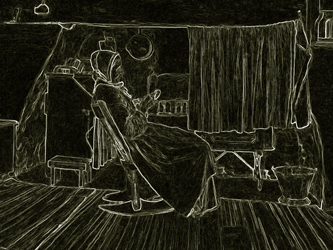
Historical Background of When You are Old
• When You are Old by William Butler Yeats was written in October of 1891. It was first published in September of 1892 in The Countess Kathleen and Various Legends and Lyrics.
• The poem is based on the forty-third sonnet in Second Livre des Sonets pour Helene by Pierre de Ronsard, published in 1578. The two poems are similarly themed though each one is distinctively different.
• The poem is written for Maud Gonne. Yeats relationship with Gonne was very complicated and had many ups and downs. It was definitely an unrequited love. However, at the time of the poem Gonne was suffering from serious depression resulting from the death of the two year old son. She was relying heavily on Yeats for comfort and counseling. Under Yeats influence she even joined the Hermetic Order of the Golden Dawn, of which she remarked that the members were “the very essence of British middle-class dullness.”
• Yeats, himself, had only recently joined the Hermetic Order of the Golden Dawn in 1890. He would stay affiliated with the order for the next 30 years. This organization, which still exists, deals mostly with the occult, metaphysics, and esoteric philosophy. For example, members are interested in Hermetic Kabbalah and so on. It’s not clear what, if any, impact this has on the specific poem, When You are Old, but this clearly did influence other poetic works of William Butler Yeats in terms of symbolism and the thesis. So potential influence here is worthy of some exploration.
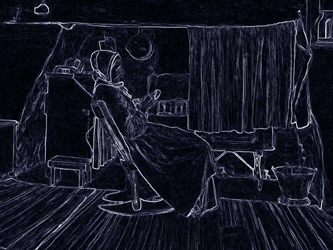
Walkthrough of When You are Old
Here we will go through each stanza, analyzing When You are Old by William Butler Yeats via an almost line by line analysis. We’ll pay attention to figurative language and poetic devices used by Yeats to convey his theme.
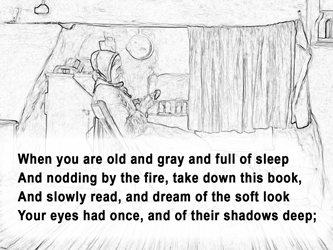
• First, note the rhyme scheme. The first and fourth lines rhyme, as well as the second and third lines. Also, note the meter, it’s an iambic pentameter—this gives the poem a musical quality. Finally, the word “and” appears six times! At least one reason for this is to assist in keeping the poem metered.
• The poem is full of gentle images, such as “Full of sleep”, “nodding by the fire”, “slowly read”, “dream,” “soft look”, and “shadows deep”. This sets the tone and mood of the first stanza which is clearly one of calmness. The first stanza is very soothing to read.
• We can guess that the book referred to above would be one by Yeats—specifically one containing poems about the beauty of Maude Gonne.
• Pay attention to the mention of eyes. Eyes are actually one of traits that perhaps, in terms of exterior appearance, age the slowest. It’s not so uncommon to find an older person with youthful and beautiful eyes. But that’s not so here! Instead, the eyes have lost their “soft look”, they’ve lost their “shadows deep.”
• The mention to the eyes helps us understand that Yeats is predicting that not only will Maude Gonne lose her physical beauty, she will lose her spiritual beauty as well. Her eyes will become those of a shallow person. She will become harsh. This is very revealing as to the theme and intent of When You are Old.
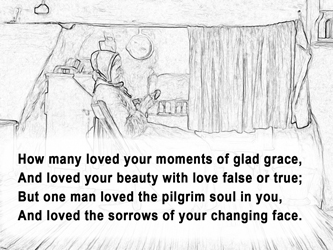
• The rhyme and meter of the poem in the second stanza is basically identical to the first stanza. However, the word “and” isn’t used as much, and the pacing here is harsher and faster.
• The implication of the first line is that people loved Maude Gonne only when she was happy and gay, but the moment she turned somber and sad, they abandoned her. So clearly this was not a true love. (In a way, at the time, this was already something Gonne was experiencing in her life.)
• Yeats, admits that some people might have loved Maude Gonne for her beauty, but even here he notes, some of this might have been superficial. This is why he states, “love false or true”.
• The use of the word “pilgrim soul” here is very important. Yeats wants to explain to Gonne that he and she are kindred spirits. They are soul mates. They both share, to at least a degree, Irish nationalism—and both at the time were interested in the Hermetic Order of the Golden Dawn. We can be sure though, that this line is meant to cut even much deeper than that—Yeats believes that they truly share something on a deep spiritual level. In this way, Yeats feels only he can really appreciate where Gonne’s truest beauty lies.
• We can contrast the final line of the second stanza with the first line of the same stanza. So long as Gonne is successful and outwardly projects happiness, superficially some man claim they love her. However, when the tide turns, and her success is no longer present, who shall lover her then? Yeats is saying he would still love her.
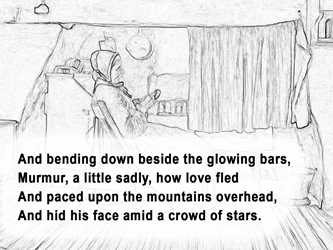
• The third stanza, as far as meter and rhyming scheme, is no different than the first and second stanza. The form is identical.
• The references to the “glowing bars” is to most likely to some type of fire grating that is so close to the fire that perhaps it glows a bit red. These bars potentially represent prison bars, suggesting that Maude Gonne is going to entrap herself. Worse, given the fiery implication here, the suggestion seems to be she’s going to find herself in a kind of earthly hell of her own making. We don’t want to suggest anything overly literal here, but only hell as a kind of metaphor. But given Yeats propensities for the occult, who knows?
• The second line of the third stanza then suggests that Maude Gonne will regret this. But her punishment is even worse, because to a degree she’ll already have lost her depth, which will limit her ability to even regret what has happened. She will truly have become imprisoned in her own future shallowness.
• While Gonne is stuck in an earthly hell of her own devising, where will Yeats be? Why up there in the heavens, of course. The love will have waited for her there on the mountains, pacing back and forth, and hoping she would come to receive it, but eventually it’ll become one with the stars, always gazing down at her from the distance—after all she’ll no longer be in a position any longer to achieve that love. The use of symbols such as mountains and stars might even be of deeper significance here. We will leave it to others to explore this possibility.

Interpretation of When You are Old
In a nut shell the poem is telling Maude Gonne that she needs to get her act together and open her heart to Yeats, because if she doesn’t she’ll grow shallow and crass and that love will grow inaccessible to her. That is, now, while Maude Gonne is in her youth, her heart is still open to the beauty of Yeats’ love and the potential it holds for both of them. She can climb the mountain easily, and together they can reach for the sky. However, if instead, Maude Gonne chooses more earthly desires and goals, she will eventually find herself self-imprisoned in the hell of her own shallowness. Yeats will still love her, but she will no longer be able to reach for that love. It’ll only be like a fading memory in a book of old.
The poem is desperately asking Maude Gonne not to let this happen!

We hope you found our analysis revealing and helpful. We encourage you to subscribe to our poetry updates so that you don’t miss our next great original poem or our next poem analysis!